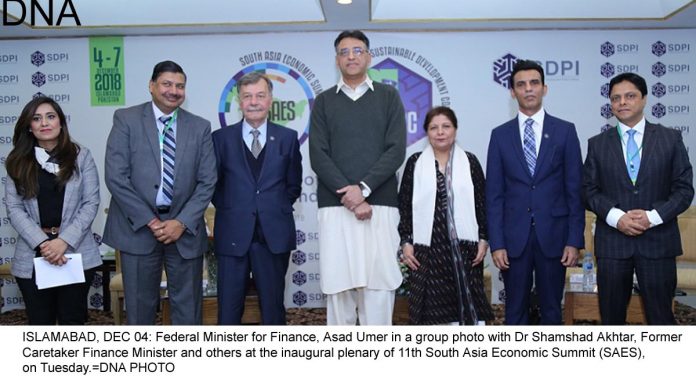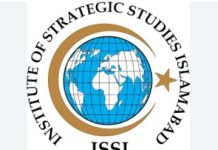
ISLAMABAD, DEC 04 (DNA) -Indian response to Pakistan’s goodwill gesture to open Kartarpur Corridor was unfortunate, however, Pakistan is still pinning hopes to strengthen SAARC cooperation in future.This was stated by Federal Minister for Finance, Revenue, and Economic Affairs Asad Umer while speaking at the inaugural plenary of 11th South Asia Economic Summit (SAES) held under the auspices of Sustainable Development Policy Institute (SDPI) in Islamabad on Tuesday.
We really need to think out of the box solutions for regional cooperation amid tensions and confrontations between the two states, the minister said, adding that Intra-regional trade, especially trade between India and Pakistan, is one of the major growth drivers.
Stressing the need to create political space for regional cooperation, he said it is our inability that we failed to get people of the region out of poverty. It is a real opportunity for those political leaders, who believe in a peaceful and prosperous South Asia.
Pakistan wants SAARC revival despite Indian intransigence: Asad
Highlighting the government’s role in promoting cross regional energy transfer and inter-regional trade, Asad Umer said channelization of non-political forums to build political space for policy making is required for an effective cooperation among South Asian states.
Commenting on the recent dollar spike against rupees, the minister said that the neutrality of State Bank of Pakistan (SBP) is intact and we believe in autonomy of the institution whereas there is no change in the government policy.
He said that the recent decision on exchange rate was taken by the central bank, however, there is a need to improve the communication mechanism, that’s why the SBP governor has also been taken on board to devise a communication mechanism in this regard.
If needed, we will further institutionalize the structure and role of SBP, he said, adding that the financing gap is complete and we don’t have any current account crisis, though a lot needs to be done.
Dr Shamshad Akhtar, the former caretaker finance minister, said that this new age of globalization and digitization, amid nationalism call for enhanced regional cooperation and connectivity.
She said that re-imagining regional connectivity is often costly and time-consuming and that require patience and leadership.
Connectivity should not be constrained to road development but to have ICT, digitization, energy cooperation and construction of ports, etc.
She said Sustainable Developments Goals (SDGs) can guide us to improve trans-boundary corridor, where institutions like SDPI has distinct role to play. “Regional connectivity is of course gaining momentum today, where Belt and Road Initiative (BRI) led by China can steer the effort for regional cooperation.”
Dr Shamshad Akhtar said that BRI has the potential to generate momentum to enhance regional partnership, which is currently in the state of deadlock especially between India and Pakistan
Dr Abid Qaiyum Suleri, the SDPI Executive Director, said that when SAARC was unable to move forward, the SAES platform kept the discussion on economy and trade cooperation alive.
He said that South Asian countries should keep their political differences aside for the sake for shared objectives, otherwise the region would remain least connected. Nevertheless, Dr Suleri said, we hope for improved regional cooperation, and opening of Kartarpur Corridor is a welcoming step for peaceful co-existence.
Dr Nagesh Kumar, the Head of UNESCAP South and South-West Asia Office, New Delhi, India, said that South Asia is today the fastest growing region in the world, however, we need to capture on the development gaps, such as poverty, gender inequality, poor state of health and education, etc.
He said that we are not able to use the talent and potential of fast economic growth and development. He said that fresh approach to development is needed where SDGs have the potential to consolidate the unfinished business of MDGs and provide the sustainable future to the people of South Asia.
Dr Ratnakar Adhikari, the Executive Director of Enhanced Integrated Framework Secretariat, World Trade Organization (WTO), Switzerland, said that it is important for South Asian countries to invent in research and development to capitalize the potential of 4th industrial revolution. =DNA
=========











